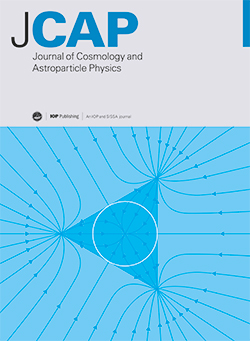通过亚稳态束缚态,统一在暗物质冻结中的作用
IF 5.9
2区 物理与天体物理
Q1 ASTRONOMY & ASTROPHYSICS
Journal of Cosmology and Astroparticle Physics
Pub Date : 2025-09-09
DOI:10.1088/1475-7516/2025/09/026
引用次数: 0
摘要
在许多阿贝尔和非阿贝尔理论中,当考虑捕获到激发态时,辐射束缚态形成的标准计算违反了部分波的统一性-即使在任意小的耦合下也是如此。最近的研究表明,通过适当地恢复入射态自能中的平方非弹性过程可以恢复统一性。考虑到亚稳态暗物质束缚态的形成和衰变是决定遗迹丰度的关键,特别是对于多tev暗物质,我们研究了统一化如何影响暗物质的热解耦。我们考虑了一个阿贝尔模型,其特征是通过发射携带守恒电荷的轻标量形成束缚态,其动力学也模拟了非阿贝尔理论的相关方面。结合激发态的俘获,我们发现,如果没有适当的处理,单一性违反是如此严重,以至于防止冻结。恢复平方束缚态形成过程恢复了统一性并确保了冻结,而捕获到激发态仍然会显著消耗暗物质。我们进一步讨论了高偏波的影响,包括在本模型内和模型外。最后,我们指出了影响结构形成的暗物质晚期解耦的有趣可能性。本文章由计算机程序翻译,如有差异,请以英文原文为准。
The role of unitarisation on dark-matter freeze-out via metastable bound states
In many Abelian and non-Abelian theories, standard calculations of radiative bound-state formation violate partial-wave unitarity — even at arbitrarily small couplings — when capture into excited states is considered. Recent work demonstrated that unitarity can be restored by the proper resummation of squared inelastic processes in the self-energy of the incoming state. We examine how unitarisation affects dark-matter thermal decoupling, given that the formation and decay of metastable dark-matter bound states are critical in determining the relic abundance, especially for multi-TeV dark matter. We consider an Abelian model featuring bound-state formation via emission of a light scalar that carries a conserved charge, whose dynamics also emulates relevant aspects of non-Abelian theories. Incorporating capture into excited states, we show that, without proper treatment, unitarity violation is so severe as to prevent freeze-out. Resumming the squared bound-state formation processes restores unitarity and ensures freeze-out, while capture into excited levels still significantly depletes dark matter. We further discuss the impact of higher partial waves, both within and beyond the present model. Finally, we point out the intriguing possibility of late dark-matter decoupling that can affect structure formation.
求助全文
通过发布文献求助,成功后即可免费获取论文全文。
去求助
来源期刊

Journal of Cosmology and Astroparticle Physics
地学天文-天文与天体物理
CiteScore
10.20
自引率
23.40%
发文量
632
审稿时长
1 months
期刊介绍:
Journal of Cosmology and Astroparticle Physics (JCAP) encompasses theoretical, observational and experimental areas as well as computation and simulation. The journal covers the latest developments in the theory of all fundamental interactions and their cosmological implications (e.g. M-theory and cosmology, brane cosmology). JCAP''s coverage also includes topics such as formation, dynamics and clustering of galaxies, pre-galactic star formation, x-ray astronomy, radio astronomy, gravitational lensing, active galactic nuclei, intergalactic and interstellar matter.
 求助内容:
求助内容: 应助结果提醒方式:
应助结果提醒方式:


